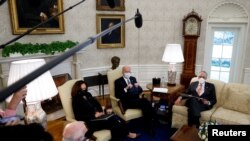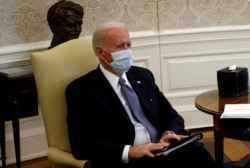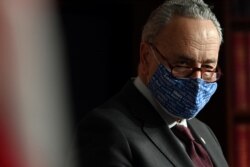U.S. President Joe Biden renewed his commitment Wednesday to send $1,400 checks to millions of adult Americans to boost the country's coronavirus-ravaged economy. But he said he was open to Republican demands to tighten restrictions on who would get the money.
In a call to Democratic lawmakers in the House of Representatives and later at a White House meeting with a group of Democratic senators, Biden called for quick passage of his $1.9 trillion coronavirus relief package that includes the stimulus checks, pushing aside a call by some Republican senators for a more limited $618 billion deal.
Biden told the House lawmakers he was willing to set lower income limits on who would get the $1,400 checks, but not cut the size of the stipends. Coupled with $600 payments approved by former President Donald Trump in December, the combined $2,000 in assistance would equal Biden's promise during his winning campaign last year for the White House.
"I am not going to start by breaking a promise to the American people," he said about the direct payments that under his plan as it stands now would go to individuals earning up to $75,000 or couples with an annual combined income of up to $150,000. Republicans and some Democrats have called for only sending the payments to people with much lower incomes.
"We can better target the number, I'm OK with that," Biden said.
Senate Republicans have called for issuing $1,000 payments for individuals earning up to $40,000 or couples making twice that, while completely phasing out the payments at $50,000 for singles or $100,000 for married couples.
But Biden told reporters, "I think we'll get some Republicans" to vote for his relief measure.
According to several people listening to the call, Biden told the House Democrats, "Let's stick together. I have your back, and I hope you'll have mine."
The president made an emotional case for quick approval of the virus relief aid, saying suicides in the U.S. were increasing at an alarming rate, and drug addiction was worsening during the pandemic.
Biden told the Democrats the Republicans' $618 billion package "was not even in the cards."
Later, Biden met with a group of Senate Democratic leaders at the White House. On Monday, he met with 10 Republican senators who pushed for their smaller relief package.
Senate Majority Leader Chuck Schumer said Democrats agreed to a "big and bold" approach.
"We want to do it bipartisan, but we must be strong," Schumer told reporters after the meeting. "We cannot dawdle, we cannot delay, we cannot dilute, because the troubles that this nation has and the opportunities that we can bring them are so large."
Senator Brian Schatz of Hawaii said, "I think we're leaving open the possibility of Republicans working with us, but I think the bottom line is we have to deliver."
Biden also told lawmakers he was more concerned that they would spend too little on a recovery package rather than too much, although some lawmakers, particularly Republicans, are balking at the overall size of the package, especially since the government approved nearly $4 trillion in relief aid last year.
The Biden measure includes billions for vaccine distribution and other medical equipment to fight the pandemic. His proposal also would hike the national minimum wage from $7.25 an hour to $15, which most Republicans oppose.
Senate Democrats on Tuesday put Biden's $1.9 trillion package on a track for fast passage, likely with little or no Republican support.
With a 50-49 vote starting discussions on government spending, the Senate cleared the way for eventual approval of Biden's relief plan with a simple majority rather than the 60-vote threshold required for most legislation.






